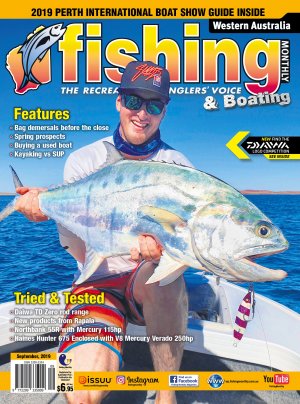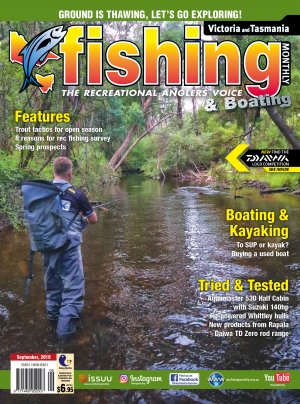Fire and drought, predictably, have been the dominant influences in our life in recent months.
Together they have had a horrendous effect on the human-made environment and a lesser, but significant, effect on the natural environment. But even more interesting events are to follow.
One of these is the ‘ash-bed effect’. Foresters and other ecologists are well aware of this phenomenon. The way it works is that when a tree is burned, its large total nutrient content is reduced to fine ash. Some of this is lost as smoke particles but the major mass remains on the ground, in a chemical and physical form that makes it readily available to plants.
When a new plant germinates, if it is in an ash bed it commonly grows many times faster and more strongly than a plant of the same species in an adjacent area, because of that higher nutrient status.
Logically, then, you might expect fish to benefit similarly after rain washes the nutrient-laden bushfire ash into a waterway. Unfortunately, that's only part of it. What more commonly happens is that micro-organisms such as bacteria, protozoa and algae, which are opportunistically fast-growing critters, get at the nutrient first.
The result is a microbial bloom in the waterway, during which the micro-organisms preferentially extract oxygen from the water, denying that valuable resource to the fish. Further, when those micro-organisms complete their life cycle, they die and other organisms then bloom, extracting nutrient from the first crop. They deplete the oxygen supply even more and the fish suffer accordingly.
This process can continue for weeks or months until the system stabilises and gets back to some semblance of ‘normality’. Where the amount of nutrient and general organic matter situation is not particularly significant, the total effect on the fish may be one of temporary discomfort, lethargy and reduced growth rate.
At a greater magnitude, the loss of oxygen could result in a fish kill. The fish mostly affected, unfortunately, are species such as brown and rainbow trout. Native fish such as Murray cod and golden perch have a greater tolerance to depleted oxygen conditions. But guess which fish couldn't care less and, in fact even revels in the low-oxygen conditions? That's right, European carp –the aquatic rats. Its advantage in life is that it doesn't only have to depend on extracting oxygen from water via the gill mechanism, as other fish do. It has a network of blood vessels inside the mouth and can gulp in air and extract oxygen from that.
And so we face the possibility of a double-whammy. Valuable recreational species such as trout, cod and perch are put at significant risk and European carp benefit from their setback. You wouldn't bloody read about it!
Having said that, surely follows the adage that when there is less water there are more fish per unit area and we should be able to catch more of them, more easily.
We put that to the test recently at Burrinjuck Reservoir, where the water is down to some disgusting level because it is being bled off to service some mystifyingly unproductive but Government-supported rice or other irrigation project downstream. It was hard slogging but, over three days, three of us found 15 Murray cod to about 15kg and 35 golden perch to about 1.8 kg, all released. The fish seemed to be in pretty good condition, with no sign of the Lernea parasite commonly found during the Summer stress period.
From the feel of their bellies, they had dined on yabbies and small fish, although in one instance there was an unmistakeable pair of little duck's feet sticking up in the throat of a cod about 12kg. The fish all fought strongly and seemed alert, well-coloured and in general good health. After it rains, which could well be by the time you read this, we will repeat the exercise and compare the catch rate and fish health.
We also fished Googong Reservoir, which is higher and colder than Burrinjuck and still around 52% full. We didn't find any cod but there were golden perch at intervals, obviously in small schools and hungry for lures. This is typical early Autumn behaviour so I would say we are in for an early Winter. That's great. We don't care how cold it gets as long as it bloody well rains.
In all of the local and regional lakes there are hordes of redfin. Most are tiny fish, more of nuisance value than fun, but occasionally there is one big enough to provide a tussle and perhaps a feed. I saw one last week that went 28cm and another that looked to weigh about 1.5kg. The population normally is kept in check during summer by the EHN virus but this season, after a tentative start it seemed to die away and the fish have developed into huge populations.
They’re not much fun for veteran and cranky anglers (i.e., anybody my age or older but not including me) but great fun for the kids. For them it makes a great diversion from hooking shopping trolleys, stolen pushbikes and the like and provides them with a real, live organism to confront. Hopefully it is a more significant and life-developing experience than sitting staring mindlessly into a television game every day after school.
The great news, too, is that the Snowy Mountains and Monaro trout lakes are bouncing back beautifully at this stage. The water is cooling with lower night temperatures and the fish are coming back closer to the surface each week. Bait and lure fishers have accounted for some fish but fly anglers have fared better. Best fly patterns have been brown nymphs during the day and mudeye patterns, Fuzzy Wuzzy, Taihape Tickler and Red And Black Matuka later in the day and at night.
Media reports may have deterred a lot of anglers from visiting the area but I can assure you that it is safe, comfortable, productive and open for business, so we look forward to seeing you.
Captions
1
Tim Pratt, obviously well taught by his Old Man, with a 15 kg Murray cod
which took a lure in upper Burrinjuck Reservoir.
2
When Sean Brodie fished Burrinjuck, even the carp were so hungry they were snatching at lures.
3
Tim Pratt with a thumping golden perch found schooling up in Googong Reservoir.
Reads: 962



